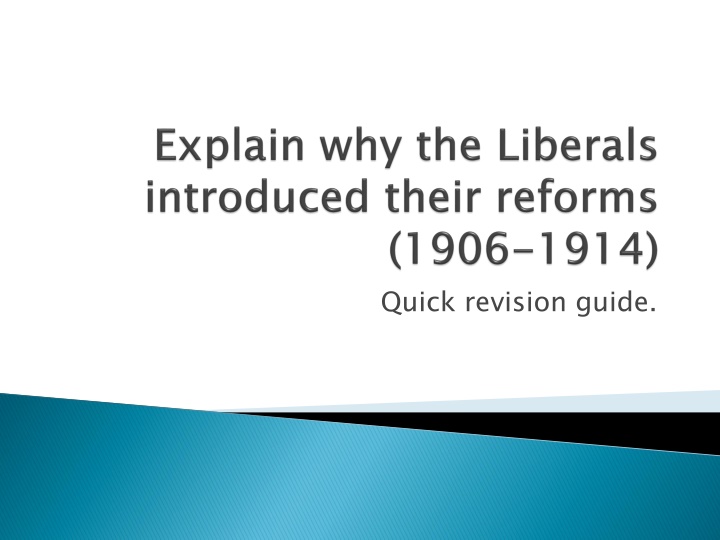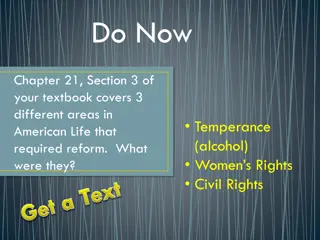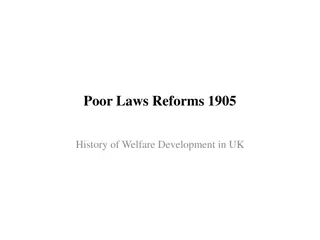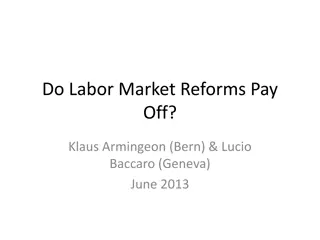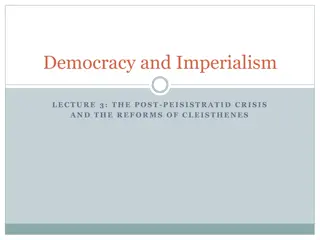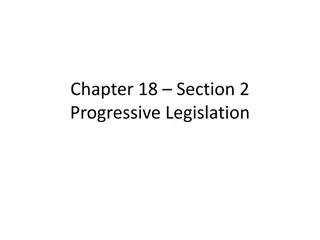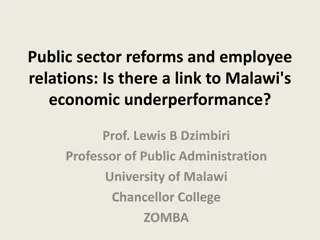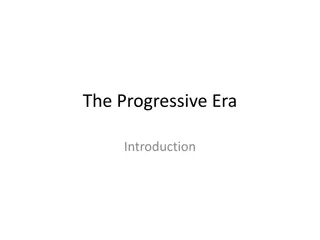Welfare Reforms in the 19th Century: A Historical Overview
In the 19th century, poverty was often blamed on individuals, leading to a laissez-faire approach by the government. Key figures like Charles Booth and Seebohm Rowntree conducted insightful studies on poverty, highlighting the need for welfare reforms. The emergence of genuine concern for the poor among New Liberals eventually led to pushes for social welfare interventions. Despite political limitations, these efforts marked a shift towards acknowledging and addressing poverty beyond charity or self-help.
Download Presentation

Please find below an Image/Link to download the presentation.
The content on the website is provided AS IS for your information and personal use only. It may not be sold, licensed, or shared on other websites without obtaining consent from the author.If you encounter any issues during the download, it is possible that the publisher has removed the file from their server.
You are allowed to download the files provided on this website for personal or commercial use, subject to the condition that they are used lawfully. All files are the property of their respective owners.
The content on the website is provided AS IS for your information and personal use only. It may not be sold, licensed, or shared on other websites without obtaining consent from the author.
E N D
Presentation Transcript
In the nineteenth century, if one fell into poverty it was seen as your own fault. The government at this time pursued a laissez-faire policy towards social issues. To improve one s situation, many people believed in the idea of self help , advocated by Samuel Smiles book of that name. Poor people relied on charity or the workhouse if they fell into poverty.
1. Booth and Rowntrees reports. 2. Self interest. 3. Genuine motives to improve welfare. 4. National efficiency. 5. National security
Charles Booth investigated poverty in London (1889) 35% of people lived in extreme poverty Produced by a sceptic Well researched. Seebohm Rowntree investigated poverty in York (1891, 1903) 25% of the population in poverty. Defined a poverty line. Defined primary and secondary poverty. Impacts of these reports: The first time scientific studies had been done. Proved falling into poverty was often out of people s control. Limits of the reports: Attitudes among the upper classes (in power) were slow to change The Liberal Reforms happened well after 1889. Evaluation: These reports were very important as their evidence showed that individuals or charities were not adequate to support a deserving poor .
Self interest the Liberals wanted to appeal to the working classes who now had the vote. The ILP (Independent Labour Party) or Labour Party (formed 1906) was growing in popularity. Impacts- this made many New Liberals (Lloyd George, Winston Churchill) push for the government to intervene much more in social welfare. Limits- no new reforms were in the Liberal manifesto and Campbell Bannerman was leader (he was not in favour of state intervention) Evaluation- political self interest was of limited importance as when the Liberals first took power in 1906, only limited reforms were introduced.
Genuine concern for the poor: New liberals like Churchill and Lloyd George supported welfare reforms. There was a realisation that old laissez faire attitudes had allowed many to sink into poverty in the world s richest nation. Impacts: Lloyd George and Churchill pushed for new welfare reforms and help for the poor. Limits: again, the Liberal leadership was controlled by an old liberal who did not want to intervene. There were no reforms in the Liberal manifesto. Evaluation: Genuine concern for the poor was somewhat of a motivation for the Liberal Reforms as attitudes towards poverty had been changing for some time, partially due to the reports of Booth and Rowntree, which were widely read and reported on among educated people.
National efficiency: Concern that Britain was falling behind its competitors. Germany (and the USA) were overtaking Britain People were unemployed in some industries and there was demand for workers in others. Impacts: the Liberals wanted to improve education, health and set up Labour Exchanges to make Britain more competitive. Limits: the reforms introduced were far more limited than the Labour Reforms of post WWII and had limited aims, therefore this may not have been a top priority. Evaluation: This was an important motivation for the reforms because Germany was threatening Britain s position in the world both militarily and economically.
National security Britain went to war with the Boers in South Africa (1899). Britain almost lost. 25% of volunteers rejected due to failed medicals. Britain was now under increasing threat could the Empire survive? Impacts: the Liberals introduced reforms to prevent children becoming malnourished (free school meals)and help people have enough to eat in case of war. Limits: the measures the Liberals brought in were quite limited and not that effective, so may not have been a high priority for the Liberals. Evaluation: Concerns for national security were a major reason the Liberals brought in reforms. Though their reforms were limited they were the first steps in improving a nation under increasing threat from a war with Germany.
